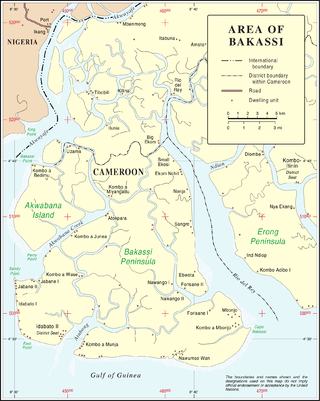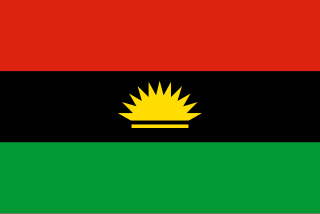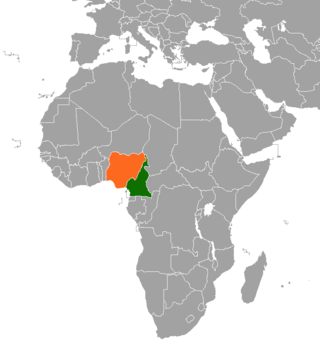
Bakassi is a peninsula on the Gulf of Guinea. It lies between the Cross River estuary, near the city of Calabar and the Rio del Ray estuary on the east. It is governed by Cameroon, following the transfer of sovereignty from neighbouring Nigeria as a result of a judgment by the International Court of Justice. On 22 November 2007, the Nigerian Senate rejected the transfer, since the Greentree Agreement ceding the area to Cameroon was contrary to Section 12(1) of the 1999 Constitution. Regardless, the territory was completely ceded to Cameroon on 14 August 2008, exactly two years after the first part of it was transferred.
The Cameroon Armed Forces are the military of the Republic of Cameroon. The armed forces number 40,000 personnel in ground, air, and naval forces. There are approximately 40,000 troops in the army across three military regions. Approximately 1,300 troops are part of the Cameroonian Navy, which is headquartered at Douala. Under 600 troops are part of the Air Force. There is an additional 12,500 paramilitary troops that serve as a gendarmerie or reconnaissance role.

Biafra, officially the Republic of Biafra, was a partially recognised state in West Africa that declared independence from Nigeria and existed from 1967 until 1970. Its territory consisted of the former Eastern Region of Nigeria, predominantly inhabited by the Igbo ethnic group. Biafra was established on 30 May 1967 by Igbo military officer and Eastern Region governor C. Odumegwu Ojukwu under his presidency, following a series of ethnic tensions and military coups after Nigerian independence in 1960 that culminated in the 1966 anti-Igbo pogrom. The Nigerian military proceeded to attempt to reclaim the territory of Biafra, resulting in the start of the Nigerian Civil War. Biafra was formally recognised by Gabon, Haiti, Ivory Coast, Tanzania, and Zambia while receiving de facto recognition and covert military support from France, Portugal, Israel, South Africa and Rhodesia. After nearly three years of war, during which around two million Biafran civilians died, President Ojukwu fled to exile in Ivory Coast as the Nigerian military was approaching the capital of Biafra. Philip Effiong became the second president of Biafra, and he oversaw the surrender of Biafran forces to Nigeria. After 53 years, in April 2023, the exiled government was restored.

The Nigerian Civil War, also known as the Biafran War, was a civil war fought between Nigeria and the Republic of Biafra, a secessionist state which had declared its independence from Nigeria in 1967. Nigeria was led by General Yakubu Gowon, and Biafra by Lieutenant Colonel Chukwuemeka "Emeka" Odumegwu Ojukwu. Biafra represented the nationalist aspirations of the Igbo ethnic group, whose leadership felt they could no longer coexist with the federal government dominated by the interests of the Muslim Hausa-Fulanis of Northern Nigeria. The conflict resulted from political, economic, ethnic, cultural and religious tensions which preceded the United Kingdom's formal decolonisation of Nigeria from 1960 to 1963. Immediate causes of the war in 1966 included a military coup, a counter-coup, and anti-Igbo pogroms in Northern Nigeria.

Cross River State is a state in the South-South geopolitical zone of Nigeria. Named for the Cross River, the state was formed from the eastern part of the Eastern Region on 27 May 1967. Its capital is Calabar, it borders to the north through Benue state, to the west through Ebonyi state and Abia state, and to the southwest through Akwa Ibom state, while its eastern border forms part of the national border with Cameroon. Originally known as the South-Eastern State before being renamed in 1976, Cross River state formerly included the area that is now Akwa Ibom state, which became a distinct state in 1987.

The Movement for the Actualization of the Sovereign State of Biafra (MASSOB) is a secessionist movement in Nigeria, associated with Igbo nationalism, which supports the recreation of an independent state of Biafra. It was founded in 1999 and is led by an Indian-trained lawyer Ralph Uwazuruike, with headquarters in Okwe, in the Okigwe district of Imo State.

The Movement for the Emancipation of the Niger Delta (MEND) is a decentralised militant group in the Niger Delta region of Nigeria. MEND's actions – including sabotage, theft, property destruction, guerrilla warfare, and kidnapping – are part of the broader conflict in the Niger Delta and reduced Nigeria's oil production by 33% between 2006-07.

The flag of Biafra, used by the Republic of Biafra during the Nigerian Civil War (1967–1970), consists of a horizontal tricolour of red, black, and green, charged with a golden rising sun over a golden bar. The eleven rays of the sun represent the eleven former provinces of Biafra. The rays are typically long and slender with the lowest rays being nearly horizontal and the remaining rays spread evenly between.

The Bakassi Movement for Self-Determination (BAMOSD) is a militant organization that seeks for the independence of Bakassi, a territory of Cameroon and formation of the Democratic Republic of Bakassi. The movement played a leading role in the Bakassi conflict.

Relations between Cameroon and Nigeria were established in 1960, the same year that each country obtained its independence. Since then, their relationship has revolved in large part around their extensive shared border, as well as the legacy of colonial arrangements under which areas of Cameroon were administered as part of British Nigeria. The countries came close to war in the 1990s in the culmination of a long-running dispute over the sovereignty of the Bakassi peninsula. In the 21st century, however, a return to conviviality has been achieved, partly because the demarcation of their border has been formalised, and partly because the Boko Haram insurgency in the Lake Chad basin has necessitated increasingly close cooperation in regional security matters.
The Greentree Agreement is a formal treaty which resolved the Cameroon–Nigeria border dispute over the oil and natural gas-rich Bakassi peninsula. The dispute had roots as far back as 1913; 1981, 1994, and 1996 armed clashes between Nigeria and Cameroon took place in Bakassi. The dispute was referred to the International Court of Justice and on 10 October 2002 the ICJ ruled in favor of Cameroon.
The 2015 Fotokol attack occurred on 4 and 5 February 2015 when Boko Haram militants reportedly killed at least 91 people by shooting and burning, and injured over 500 in Fotokol, Cameroon. The militants, who are based in northeastern Nigeria and active in Chad, Niger and northern Cameroon, also torched mosques and churches of the town. This attack came a day after the regional forces said it had driven Boko Haram from Gambaru, a Nigerian town close by. This was the second foreign country attack by the militants in 2015. This region of Niger is an area where refugees had arrived by the thousands seeking safety from Boko Haram attacks.

The Indigenous People of Biafra (IPOB) is a separatist group in Nigeria that aims to restore the defunct Republic of Biafra, a country which seceded from Nigeria prior to the Nigerian Civil War (1967–1970). Since 2021, IPOB and other Biafran separatist groups have been fighting a low-level guerilla conflict in southeastern Nigeria against the Nigerian government. The group was founded in 2012 by Nnamdi Kanu and Uche Mefor. Kanu is known as a British Nigerian political activist known for his advocacy of the contemporary Biafran independence movement. It was deemed a terrorist organization by the Nigerian government in 2017 under the Nigerian Terrorism Act. As of May 2022, the United Kingdom started denying asylum to members of IPOB who engaged in human rights abuses, though the U.K. government clarified that IPOB had not been designated as a terrorist organisation.
The Biafra Zionist Front (BZF), formerly known as the Biafra Zionist Movement and also known as the Biafra Zionists Federation, is a group agitating for the restoration of Biafra and its independence from Nigeria. It is led by Benjamin Onwuka. The movement's purpose is the actualization of the sovereign state of Biafra along precolonial lines.

The Anglophone Crisis, also known as the Ambazonia War or the Cameroonian Civil War, is an ongoing armed conflict in Cameroon's English-speaking Northwest and Southwest regions between Cameroon Armed Forces and Ambazonian separatist groups, part of the long-standing Anglophone problem. Following the suppression of 2016–17 protests by Cameroonian authorities, separatists in the Anglophone regions launched a guerrilla campaign and later proclaimed independence. Within two months, the government of Cameroon declared war on the separatists and sent its army into the Anglophone regions.
The Ambazonia Defence Forces (ADF) are a military organization that fights for the independence of Ambazonia, a self-declared independent state in the Anglophone regions of the former Southern Cameroons, Cameroon. It was formally established by the Ambazonia Governing Council (AGovC) on 9 September 2017, the same day as the organization declared a war of independence.

The Bakassi conflict is an ongoing armed dispute over the Bakassi Peninsula of Cameroon. Originally subject to a border conflict between Cameroon and Nigeria, Bakassi later became affected by insurgencies waged by local separatists against Cameroonian government forces.
This is a timeline of the Anglophone Crisis during 2021.

The insurgency in Southeastern Nigeria is a military conflict that broke out in the city of Orlu, Imo State, Nigeria on 16 January 2021, when the Nigerian Army moved to crush the paramilitary wing of the Indigenous People of Biafra (IPOB), the Eastern Security Network (ESN). The conflict escalated after the ESN managed to repulse the initial push by the Nigerian Army, but IPOB ended the initial crisis by unilaterally withdrawing the ESN from Orlu. After a few weeks of quiet, Nigeria launched a military offensive in the area to destroy the ESN. On 19 February 2021, IPOB declared that as of the day before, a state of war existed between Nigeria and Biafra. Three weeks later, another separatist group declared the formation of a Biafran interim government which was subsequently endorsed by IPOB. Since then, the Biafran separatists have begun to form alliances with other separatist groups in Nigeria and Cameroon. Despite these developments, the separatists claimed that their militant operations were mainly aimed at defending local communities from armed herders and bandits instead of fighting the Nigerian government. In late June, IPOB leader Nnamdi Kanu was arrested by Interpol and handed over to Nigerian authorities.
This is a timeline of the Anglophone Crisis in Cameroon during 2022.










